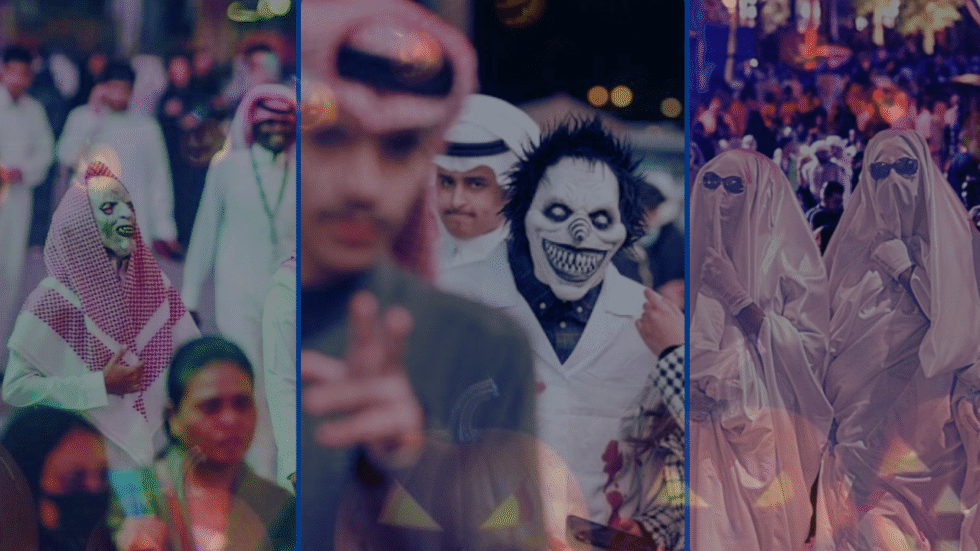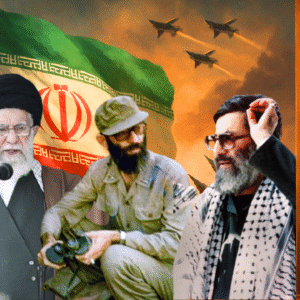Haunted by Compromise: Halloween’s Threat to Faith and Values

Skulls and skeletons. Witches and monsters. Demons and death. On October 31, the world seems to revel in the macabre. Shopping malls glow with carved pumpkins, streets swarm with costumed crowds, and retail aisles groan under mountains of candy and decorations. Halloween has grown into a full-blown spectacle, complete with haunted attractions, themed parties, and social media-ready photo ops. Even in Muslim-majority countries like Saudi Arabia, Halloween draws crowds in elaborate horror costumes, highlighting how this once-Western festival has expanded globally, blending entertainment, commerce, and a push to project a modern, cosmopolitan image.
Halloween as a Multi-Billion-Dollar Industry
Halloween has morphed into a multi-billion-dollar global industry fueled by relentless consumerism. Americans alone are expected to spend over $13 billion this year, while countries such as the United Kingdom and Canada have also embraced the holiday’s booming commercial appeal.
However, its roots lie far from the glitter of store aisles. Originating in ancient Celtic folklore, Halloween was born from the belief that spirits could cross the boundary between life and death and return to the world of the living. Unlike other Western holidays such as Christmas or birthdays, it emerged from a worldview that defied divine order. Even if today’s celebrations appear divorced from those pagan origins, the underlying symbolism of rebellion against God endures, masked by costumes and entertainment.
Retailers begin marketing the season months in advance, making it one of the most profitable seasons of the year. Beyond children’s trick-or-treating, the market now encompasses adult costumes, themed parties, haunted attractions, and even pet outfits. What once had ancient pagan roots has evolved into a highly commercialized spectacle, a reminder of how modern society often replaces meaning and reflection with marketing and material excess.
The Commercialization of Fear, Death, and Sin
Modern Halloween reflects the commercialization of fear, death, and sin. Symbols once meant to warn against evil are now packaged and sold for entertainment. Fear, death, and the supernatural have become commodities, marketed through films, decorations, and themed parties. Death, which is a reality meant to inspire humility and reflection in people, is trivialized into costumes of zombies and skeletons, stripping it of moral and spiritual weight. Even representations of evil, once viewed as warnings of sin, are now turned into playful or attractive figures for consumption.
This transformation points to a deeper cultural shift: the detachment of morality from entertainment, and the normalization of what Islam and many other faiths teach to fear and avoid. When society turns what is spiritually harmful into sources of amusement, the boundaries between right and wrong become blurred. What was once a reminder to seek protection from evil is now presented as something to laugh at or imitate. This desensitization weakens the moral compass, making sin appear harmless and even appealing.
Capitalism and Moral Decay
This commercialization and desensitization also reflects a broader moral decay fueled by capitalism, which values marketability over meaning. In a system driven solely by material profit, nothing is sacred; even symbols of evil, death, and moral corruption are repackaged and sold if they attract attention and generate revenue. The grotesque becomes entertainment, and the sinful becomes trendy. Capitalism thrives by transforming every human emotion, including fear, into a consumer experience, eroding the moral boundaries that once distinguished good from evil. Halloween, in this sense, mirrors a society where commerce replaces conscience and spiritual reflection is displaced by spectacle.
Moral Numbness and Global Implications
The moral detachment seen in Halloween also extends to global affairs. The same numbness that allows horror to be commodified enables indifference to real-world suffering.
When death and evil are turned into entertainment, people gradually lose sensitivity to actual injustice, pain, and loss. This desensitization manifests in how global audiences can witness scenes of devastation and atrocity yet remain largely unmoved or distracted by trivial pursuits.
The ongoing genocide in Palestine, for example, exposes a profound hypocrisy: governments that claim to uphold human rights and democracy, like that of the United States, continue to finance, arm, and politically shield the Zionist regime as it inflicts unimaginable suffering upon innocent civilians in Gaza. This contradiction reveals a world where moral principles are easily sacrificed for political alliances, power, and economic interests. The normalization of horror for entertainment mirrors the normalization of oppression on the world stage as both numb human empathy and distort moral clarity. It is a reflection of a culture that glorifies power over justice, material profit over compassion, and silence over truth.
The Moral and Spiritual Stakes
However, beyond the enormous spending and moral numbness lies a deeper concern: the values and messages that celebrating Halloween communicates. For Muslims, and for people of faith more broadly, celebrating a festival rooted in pagan and secular traditions raises serious questions.
Death, demons, and the supernatural are not meant to be entertainment; they are profound realities intended to provoke reflection, humility, and moral responsibility. Muslims are encouraged to frequently remember death because it serves as a powerful reminder of the temporary nature of this world and the certainty of the Hereafter. This remembrance cultivates humility, gratitude, and mindfulness, prompting believers to assess their actions and intentions in light of their ultimate accountability before God. By reflecting on death, a person becomes more conscious of avoiding sins, injustice, and negligence, and instead strives to engage in good deeds, repentance, and acts of compassion. It helps to realign one’s priorities, valuing spiritual growth over worldly gains, and strengthens the resolve to live a righteous life that earns divine mercy and eternal success.
In addition, participation risks blurring the line between cultural curiosity and spiritual compromise, slowly eroding the monotheistic identity and worldview that faith is meant to protect.
For Muslims, faith is not merely a matter of belief in the heart. It shapes every aspect of human life, values, actions, and moral choices. Every act carries significance, reinforcing ethics and purpose. In this light, adopting celebrations like Halloween is far from neutral. It conveys a subtle message: that one can selectively borrow elements of other cultures without consequence. Yet identity is not a buffet. Small compromises, repeated over time, can accumulate, and what begins as “fun” may gradually blur the moral and spiritual boundaries that faith seeks to uphold. The deeper question is: where should one draw the line between what is permissible and what risks eroding core values?
The Slippery Slope of Cultural Borrowing
This question becomes especially urgent when considering the “slippery slope” effect. Celebrating Halloween may seem harmless at first, but it often leads to participating in other non-Muslim holidays such as Valentine’s Day, Christmas, or secularized festivals, where the underlying themes or symbols contradict Islamic teachings. If one justifies participation in one foreign celebration for fun or social acceptance, where does it end? At what point does cultural borrowing become a compromise? This cumulative effect is precisely what makes these choices critical: identity and faith are not selective; they are holistic.
Festivals with Spiritual Purpose
Every Islamic festival carries profound spiritual purpose. Eid al-Fitr, for example, celebrates gratitude for Allah’s mercy and the discipline of Ramadan, while Eid al-Adha honors Prophet Ibrahim’s obedience and encourages compassion and charity. Every ritual reinforces moral reflection and spiritual awareness. Celebrating Halloween, by contrast, emphasizes costumes, fear, and material indulgence, erasing the sacred dimension of joy and replacing it with commerce-driven spectacle. True celebration in Islam is never empty or aimless; it is always an act of worship, gratitude, and moral alignment.
The Ultimate Question
Ultimately, the debate over Halloween is not about rejecting fun or social interaction. It is about recognizing the subtle ways culture shapes morality and asking: if we compromise on small symbolic choices, what does it cost us spiritually? Small, seemingly harmless acts can accumulate into larger compromises, eroding both conscience and faith. In this light, Halloween is more than a holiday; it becomes a cultural test, asking whether pleasure and profit can quietly replace meaning, and whether one can navigate the modern world without compromising identity and values.
Halloween may dazzle with commerce and thrills, but beneath the costumes and candy lies a deeper lesson about choices, identity, and conscience. Every decision to participate in a celebration carries meaning, shaping not only how we experience joy but how we perceive right and wrong.
For Muslims and for anyone seeking to live deliberately according to faith and principle, the question is clear: do we allow fleeting entertainment to dictate our values, or do we preserve moral and spiritual boundaries even when the world encourages compromise? In a society that increasingly blurs the line between fun and moral indifference, choosing conscience over convenience is not merely a personal act; it is a statement about who we are, what we stand for, and what we are willing to protect in the face of a culture that commodifies everything, even the sacred.
If you value our journalism…
TMJ News is committed to remaining an independent, reader-funded news platform. A small donation from our valuable readers like you keeps us running so that we can keep our reporting open to all! We’ve launched a fundraising campaign to raise the $10,000 we need to meet our publishing costs this year, and it’d mean the world to us if you’d make a monthly or one-time donation to help. If you value what we publish and agree that our world needs alternative voices like ours in the media, please give what you can today.




